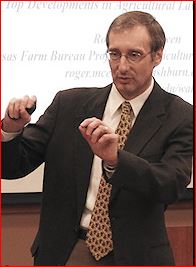Farm Succession Planning Required For Families To Stay On The Land

By Frank J. Buchman
Many farm and ranch owners desire to keep the business operating within the family well into the future.
Actions to help facilitate such a succession plan were reviewed by Roger McEowen at a recent Farm Profit Seminar in Ottawa.
Agricultural law and taxation professor at Washburn Law School and Kansas State University, McEowen pointed out barriers to doing succession planning.
“This is subjective so don’t start with trying to figure out what is fair,” he emphasized. “Whether someone will be angry at your decisions should be of no concern, because you are making a business decision.”
Plans must be tied to one’s personal goals. “Make sure you are adequately taken care of in retirement years,” McEowen said. “It’s essential to minimize taxes yet keep the farming operation viable.”
Most people really don’t have any idea where to begin succession planning. “Find a competent professional who does farm and ranch estate planning, then let them do the work,” McEowen advised.
Typically farm operators keep putting off succession planning. “Someday never comes,” McEowen said. “Farmers think year-to-year and never contemplate death.”
Average age of a farmer in the United States is 64-years-old. “Don’t wait until it is too late,” McEowen insisted. “How much sand is in the top of the hourglass?”
Expenses for succession planning often seem to be a farrier for farmers. “It could cost from $2,000 to maybe $10,000, depending on the size of an operation,” McEowen said. “So keep it in perspective. That’s not any more than the cost of a new tire for a combine. Isn’t your farm’s legacy worth the price of a tire?”
Often farmers shrug off the issue of estate planning thinking their children will figure it out after they’re gone. “If you think that will happen, it’s more likely that a judge will figure it out,” McEowen said.
Details about estate and gift taxes were reviewed in detail. Congress can change tax liabilities and exemptions making use of the estate planner’s knowledge even more important, McEowen advised.
“Good estate planning requires flexibility to adjust to possible changes in taxation laws,” McEowen emphasized.
Getting started is the key, the speaker pointed out. Basic requirements are a balance sheet, summary of assets and liabilities, basic objectives and power of attorney.
According to definition, power of attorney is a “written authorization to represent or act on another’s behalf in private affairs, business, or some other legal matter.”
When the transition of a business is involved, the power of attorney has the authority to make financial and heath decisions. “Make sure succession planning includes the family and name the power of attorney,” McEowen demanded.
Among focuses of estate planning are life expectancy, lifestyle, long term healthcare needs, potential gross estate and economics.
Objective of succession typically is to bring the next generation into the financially successful agriculture business for the future.
“There needs to be an exit plan for the current generation with fairness for on-farm and off-farm heirs,” McEowen said. “Yet, it’s critical to minimize income taxes.”
There are ways for children to become involved in a farming operation without special agriculture interests or labor.
Possibilities include long-term acquisition of assets and control with supplemental off-farm income, or off-farm employment coupled with a rental arrangement.
“A farm partnership with sharing of labor and capital is common,” McEowen noted. “What works best is highly dependent on the facts, yet the impact of altered structures of tax laws must be considered.”
Social Security benefits should not be overlooked while considering recommendations of the estate planning professional and retirement advisors. “Farmers and ranchers want to maximize their Social Security benefits while minimizing the reductions,’ McEowen said.
Lifetime agriculture operators are typically concerned about equitably treating their heirs. “Don’t involve off-farm heirs in day-to-day operations,” McEowen recommended. “Off-farm heirs should receive their inheritance by gift or as life insurance beneficiaries.”
Join ownership of real estate by the heirs often leads to partition and sale. This can bring family qualms often defeating certain objectives of farm succession planning.
“Leadership and management of the agriculture operation are different, and must be coordinated,” McEowen said. “Still, it’s always essential to provide income for parents in retirement.”
Issues impacting estate planning are marriages, birth/death of children, divorce/separation of beneficiaries, and changes in laws, value and objectives.
Some families believe there is insufficient wealth to necessitate estate planning. “Under estimating wealth is common. Everything has value,” McEowen stated. “Land is liquid justifying a need for liquidity planning considering pre-death and post-death along with insurance values.”
Estate planning is frequently “put-off,” because of too much complexity. “While there are many areas to be considered, simply not doing anything is the worst thing of all,” McEowen warned.
For assistance in planning for farm succession, McEowen welcomed email contact with him at [email protected] and Facebook.

Roger McEowen, professor of agricultural law and taxation, pointed out importance of planning for farm succession at a recent Farm Profit Seminar in Ottawa.


